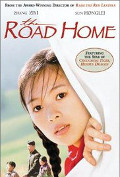
Directed by
Zhang Yimou
Rated G
Reviewed by
Bernard Hemingway

The Road Home
Synopsis: China 1958. Luo Yusheng (Sun Honglei) returns to his village from the city for the funeral of his father. His mother, Zhao Di, insists that her husband's coffin be carried along the road on which as a young man, he had come back illicitly to see her when they were courting. Yusheng is reminded of the story of the romance between his parents, begun when his father arrived as the new teacher.The Road Home is the kind of classic love story one is not too familiar with these days. Innocent, undying devotion that transcends the passage of time. I'm sure the nineteenth century was awash with them and Mills and Boon crank out the doggerel in imitation of them. And sometimes during this film one can't help but acknowledge (whilst wiping away the tears) that.albeit very tastefully, one is being emotionally manipulated, particularly as the lushly romantic score surges up whilst the camera closes up on the pining maiden (the young Zhoa Di, played by the photogenic Zhang Ziyi) anxiously awaiting her hoped-for lover.
If that seems to suggest that this is a hackneyed film, it is not intended. Yes it is picturesque and idealized but it is also quite wonderful. Superbly photographed in Cinemascope, visually it is stunning and its depiction of a time and place not so long gone yet so far away is a remarkable physical achievement, skilled in realisation (the snow scenes are particularly notable) yet free of cinematic flourish. In fact so many scenes are like beautiful stills come to life.
The main story is told with a sparing amount of dialogue and convincingly embodied by all the players. The elements of the story (the food, the visits to the well, the loom and so on) are used as motifs that are built upon and varied to create a texture and rhythm in keeping with its simplicity. Yet there are larger themes to do with Chinese society both before, during and after the Cultural Revolution that are woven into the narrative, giving it added resonance.
Split into two parts, the contemporary arrangements for the funeral, which we see in black and white and the flashback to the parents' courtship, which is in colour, despite being narrated by the son, the events are very much Zhoa Di's story. Inverting the usual relationship in which flashbacks are often drained of colour, the black and white was no doubt intended to suggest the colourless nature of life for Zhoa Di after the death of the husband. For me however technically it seemed not quite right, appearing as if shot in colour but printed in black and white, having a strange glossiness, particularly in the exteriors. One other criticism is that the director seems to have made an unfortunate equation between romantic yearning and running. There are so many scenes of young (and even old) Zhoa Di running in her odd puppet-like way that this could have been sub-titled Run Zhoa Di, Run.

Want more about this film?


Want something different?




